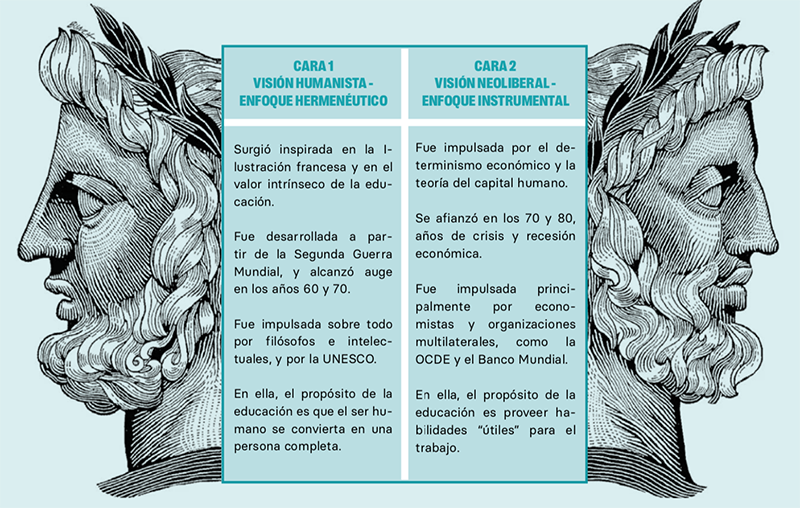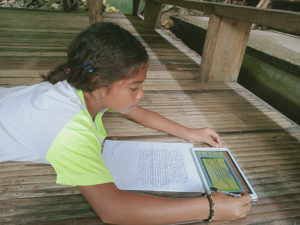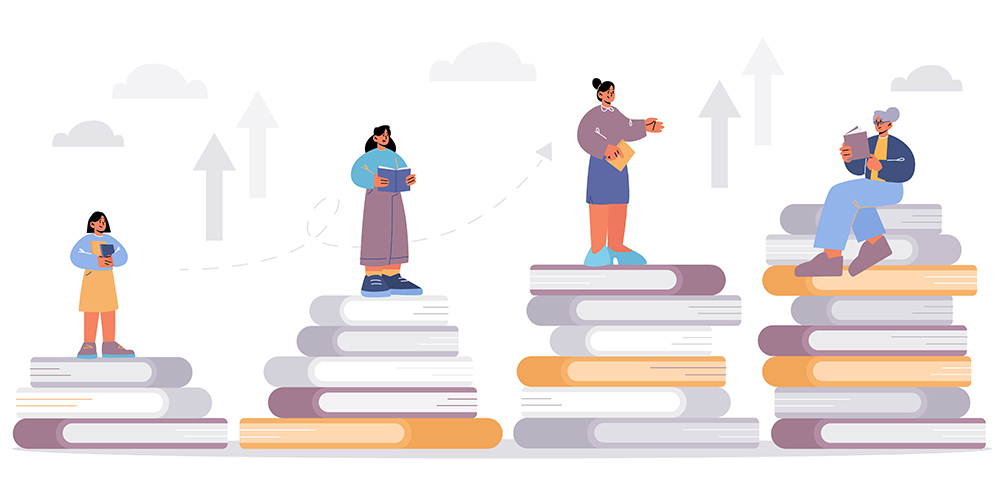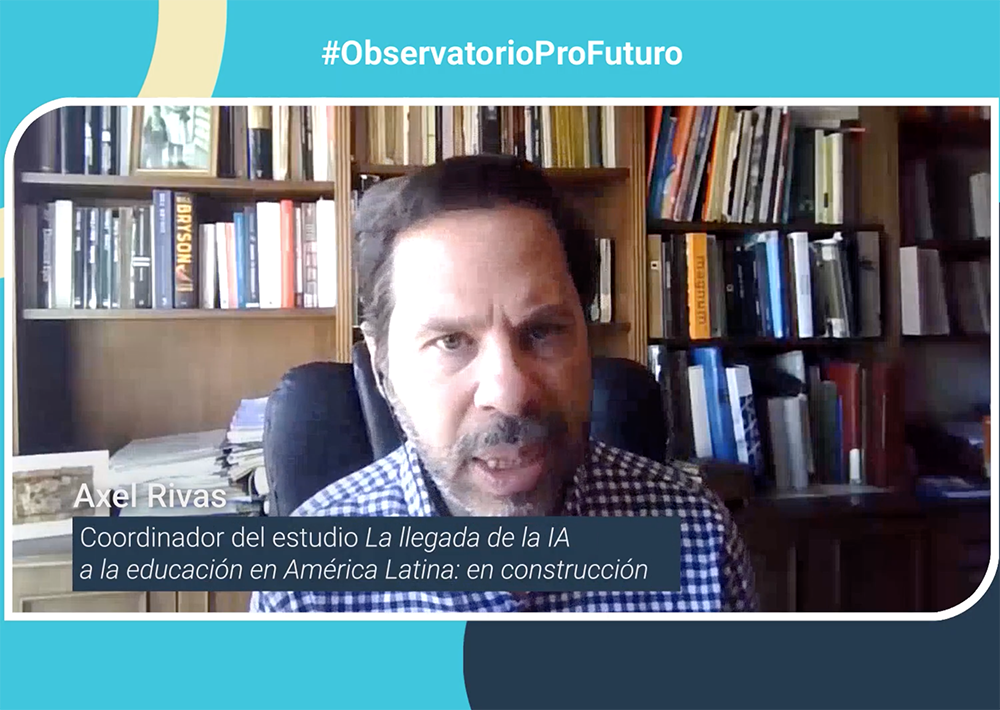In an era of rapid technological change and unprecedented social challenges, lifelong learning has become a fundamental pillar for the personal and professional development of individuals and the key to achieving better organized and complete societies. In this context, the school plays a central role by providing the foundations for continuous learning and providing the necessary tools to face the challenges of a constantly changing world. In this article, we will explore the importance of lifelong learning, its impact on individual development, and the crucial relevance of school in this exciting journey of discovery and constant growth.
Conceptual tensions
The Lifelong Learning report, published by the Tec de Monterrey through the Observatory of the Institute for the Future of Education, presents an exhaustive historical overview of the evolution of the term and the tensions between the humanist vision and the utilitarian vision of the concept. Due to its great relevance for the understanding of the subject, we have thought it appropriate to summarize here the key points of this disquisition.
The report explores how, since the end of World War II, two main visions of lifelong learning have taken hold, which differ significantly from each other. On the one hand, there is the humanist vision, supported by philosophers and intellectuals from UNESCO, which advocates a hermeneutic approach focused on the integral development of people. On the other hand, we find the utilitarian vision, supported by economists from the OCDE and the World Bank, which leans towards a more instrumental approach, focused on preparing individuals for a world of work and an economy in constant evolution.
School plays a central role in providing the foundations for lifelong learning and the tools necessary to meet the challenges of a changing world.
The Lifelong Learning report, published by the Tec de Monterrey through the Observatory of the Institute for the Future of Education, presents an exhaustive historical overview of the evolution of the term and the tensions between the humanist vision and the utilitarian vision of the concept. Due to its great relevance for the understanding of the subject, we have thought it appropriate to summarize here the key points of this disquisition.

Source: Lifelong Learning. Observatory of the Institute for the Future of Education. Tecnológico de Monterrey. 2023.
Faced with the challenges of the new millennium, UNESCO initiated debates on education for the 21st century, which led to the creation of the International Commission on Education for the 21st Century, led by the former President of the European Commission Jacques Delors. Under his presidency, the Delors Report was published in 1996, which, under the title Education contains a treasure, reintroduced the concept of education throughout life and emphasized learning as a process that provides equal opportunities in response to economic demand.
The Delors Report was praised for highlighting the link between lifelong learning and social stability, but was also criticized for its lack of a pragmatic approach and concrete answers. However, despite these criticisms, the Delors Report challenged the prevailing instrumental vision and was highly relevant in confronting the gradual colonization of education by the world of work.
Today, the concept of “lifelong learning” has evolved and has established itself as a key idea in education. Over the years, it has gone from being a utopian and visionary notion to becoming a fundamental principle for the personal and professional development of people in a society like today’s, in which challenges have multiplied and demand adaptability from their populations (UNESCO, 2022).
Learning for everyone, anytime, anywhere

Now, what does lifelong learning mean today? What are the essential elements that make up the term? Why should we promote it? What role does the school play in a world where we all have to learn all the time?
This notion is based on five key elements:
- All age groups. It starts at birth and extends throughout life, serving the needs of people of different ages, backgrounds and communities.
- All levels of education. It seeks to connect the different educational levels, from early childhood to higher education, including adult education and technical and professional training.
- All learning modalities. It includes formal, non-formal and informal learning, considering different approaches and educational contexts.
- All fields and learning spaces. It goes beyond schools to include spaces like families, communities, workplaces, libraries, and online and distance learning platforms.
- A variety of aims. It is people-centred and based on human rights.
By working together to remove barriers and provide learning opportunities at all stages of life, we will build a society that is better prepared and more resilient to face the challenges ahead.
Why should we promote Lifelong Learning?
As we have already mentioned, today’s world is experiencing dizzying economic, technological, environmental and social changes, which make it essential to encourage adaptation, creativity and learning throughout life. People can no longer depend solely on the skills and knowledge acquired in formal education, during their school or university years.
Next, we will see, hand in hand with UNESCO’s Institute for Lifelong Learning, how LL offers a response to six main trends that affect the world today (UNESCO, 2022).
Developments in digital technologies
Digital technologies are transforming the skills required at work and creating new opportunities, but a “digital gap” persists with inequalities in infrastructure and digital skills. In this context, lifelong learning (LL) is essential. Accessible and multifunctional mobile technology has opened up new learning opportunities in diverse settings. SDG 4 highlights the importance of information and communication technology (ICT) skills for employment and entrepreneurship, and highlights the need for digital literacy and access to technology to take advantage of online education and vocational training opportunities with virtual and augmented reality.
Changes in the world of work
The work market is undergoing rapid changes due to automation, artificial intelligence, and technological evolution, making it very difficult to predict the job skills that will be required in the future. In addition, the pandemic has increased employment inequality, especially for women and less-skilled work, and workers are expected to change jobs more frequently, requiring constant re-skilling. Unemployment and underemployment are fundamental concerns for public policies, especially in the case of young people, but the ALTV can provide relevant skills to improve their chances in the work market.
Demographic changes
The Lifelong Learning (LL) component is essential in a context of significant demographic change. With the population ageing and fewer young people entering the work market, continuous updating and professional re-training is needed. The forced displacement of people also poses challenges for the integration of refugees into education and the work market. Although some countries have implemented positive policies for the educational integration of refugees, many communities still lack adequate educational opportunities. LL can overcome cultural and language barriers, promote tolerance and social cohesion, and provide learning opportunities for diverse populations throughout their lives, including older workers, thus contributing to social and economic sustainability.
Climate emergency
LL plays a fundamental role in the face of the emergency situation generated by climate change by providing accessible learning opportunities to sensitize populations about climate change and its consequences. In addition, LL builds resilience to climate change by empowering people to identify and deal with emerging challenges and develop sustainable responses and solutions.
Health and well-being
Engagement in learning has been shown to improve health and lead to healthier behaviours and attitudes, resulting in longer life expectancy and a reduction in lifestyle-related diseases. In addition, learning in health can train people to care for themselves and their families, and it also promotes citizen education, where the impact of individual actions on the collective health of the community is recognized.
Strengthening of citizenship
Today’s world faces unprecedented social, economic and environmental challenges that are driven by accelerating globalization and technological development. To empower citizens with knowledge to address these issues, global citizenship education is essential, as it promotes understanding of social values, critical thinking, and active participation in solving global challenges. In addition, it applies a LL perspective, beginning in early childhood and continuing at all levels of education through adulthood, including formal and informal approaches.
The role of the school
As the educational institution par excellence, schools are in a unique position to promote a culture of lifelong learning by laying the foundations for its promotion, awakening the curiosity of children and encouraging them to become lifelong learners (UNESCO, 2022).
How can school promote lifelong learning? We see it:
- Fundamentals and basic skills. The school provides the fundamental knowledge and basic skills necessary for continuous learning. These include reading, writing, mathematical skills, critical thinking and digital literacy. These competencies are the foundation on which people can continue to learn throughout their lives.
- Fostering a learning mindset. The school can cultivate a mindset of continuous learning in students. This involves promoting curiosity, exploration, self-direction, and a willingness to take on new challenges and acquire new knowledge and skills throughout life. By fostering a positive attitude toward learning, the school prepares students to continue learning and growing even after their formal education ends.
- Access to resources and opportunities. The school can facilitate access to educational resources, such as libraries, laboratories, technology and teaching materials. It can also provide opportunities for participation in extracurricular activities. These experiences complement formal classroom learning and allow students to explore different areas of interest and broaden their horizons.
- Support and guidance. The school plays an important role in providing support and guidance to students on their lifelong learning journey. This may include academic and career counselling, career guidance, mentoring, and emotional support. The school can help students identify their interests, set educational and career goals, and provide them with the support they need to achieve those goals throughout their lives.
In conclusion, lifelong learning is an essential tool for the personal and professional development of individuals in a constantly changing world. To make this vision of lifelong learning a reality, political and institutional efforts are required, such as those demonstrated by the European Union in its Strategic Framework for European Cooperation in Education and Training, a proactive and coordinated approach to promote lifelong learning between Member States. Collaboration between governments and educational institutions is essential to provide accessible and relevant learning opportunities for all people, regardless of age or background.
By working together to remove barriers and provide learning opportunities at all stages of life, we will be building a society that is more prepared and resilient to face future challenges. Lifelong learning is a pathway to a bright and equitable future for all.
References
Monterrey Institute of Technology. 2023. Lifelong learning. Observatory of the Institute for the Future of Education. EduTrends. Available at https://observatorio.tec.mx/wp-content/uploads/2023/06/Reporte-Edu-Trends-Aprendizaje-a-lo-largo-de-la-vida.pdf
UNESCO. 2022. Make lifelong learning a reality. Institute for Lifelong Learning. Available at https://unesdoc.unesco.org/ark:/48223/pf0000384098






